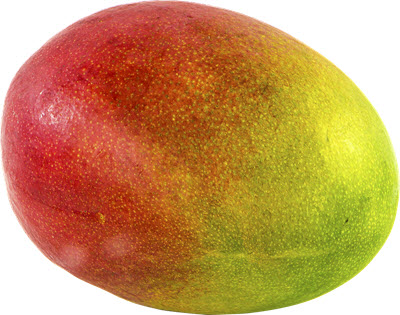Mango

Although it is grown in several countries possessing a tropical climate, the mango or ma-muang, is a very popular fruit in Thailand. Like most tropical fruit, the mango is grown on a tree but is more biologically related to the cashew and the pistachio.
After the mango tree produces its white, sweet smelling blossoms, the mango fruit begins to emerge but only once a year. Full grown, the stone fruit is mostly red, orange or yellow with green tones and can sometimes have a paisley shape said to have inspired the Indian paisley pattern.
There is much debate over whether the mango is the king of fruits, but it would be safe to say that it is worthy of the title just for its culinary attributes alone. Whether juiced, eaten with sticky rice and coconut milk or just eaten raw with a spoon, it is truly delicious.
Some of the more popular savory ways to eat mango are yellow curry with mango, mango in stir-fry with chicken, mango with stir-fry shrimp, mango in salads as well as mango sauces and dips.
 The list of culinary contributions the mango makes is not complete without mentioning the most favorite of the Thai desserts. Mango with sticky rice and coconut milk or “khao niaow ma muang” is a Thai classic and relatively simple to make.
The list of culinary contributions the mango makes is not complete without mentioning the most favorite of the Thai desserts. Mango with sticky rice and coconut milk or “khao niaow ma muang” is a Thai classic and relatively simple to make.
Mango is also great as a main ingredient to sorbet, puddings, cakes and shakes.
When you buy some, make sure they are ripe, whether red or green. Green mangoes ripen, but stay green and are quite popular in Thailand as well.
To determine if the fruit is good to eat, press on the skin and make sure it is not too hard.
To speed up the ripening process, just place them in a paper bag and it will ripen them within a day or two. Mangos can be stored in the refrigerator for up to two weeks, frozen with the aid of sugar, canned and even dried.
Health Benefits of the Mango
It is difficult to believe that a fruit so sweet and versatile can be so healthy.
The health benefits from this fantastically healthy fruit are numerous and have helped to position it in consumer’s minds not just as an edible fruit, but a medicinal one as well.
At just over one hundred calories, the Mango generously provides almost all of the daily recommended dose of vitamin C.
It is also rich in potassium, magnesium, copper and quite rich in fiber.
It boasts a quarter of the daily recommended dose of vitamin A, as well as being rich in vitamin B6.
The medicinal benefits of Mangos range from offering a high dose of antioxidants for cancer prevention to helping ease anemia symptoms caused by low iron.
The super fruit also aids in overall eye health, inflammation, digestive health and boosting the immune system. Used in Chinese herbal medicine, the Mango even helps with seasickness, bleeding gums and fever.
Take some time soon to enjoy this exotic Southeast Asian fruit wherever you live and enjoy its sweet rewards.
